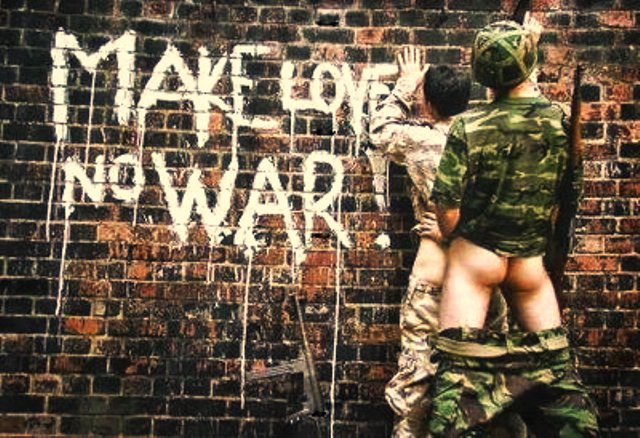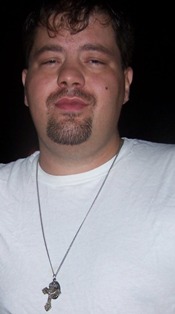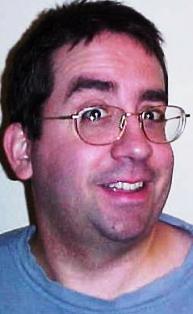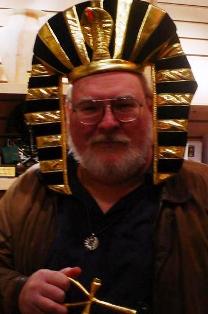Edits to gay soldier’s Wikipedia entry traced to Pentagon
Anonymous user deleted references to sexual orientation
By CHRIS JOHNSON, Washington Blade | Apr 3, 12:49 PM A Wikipedia article about Maj. Alan Rogers, a gay soldier who was killed in January in Iraq, was apparently edited by someone in the Pentagon, who removed any mention that Rogers was gay.
A Wikipedia article about Maj. Alan Rogers, a gay soldier who was killed in January in Iraq, was apparently edited by someone in the Pentagon, who removed any mention that Rogers was gay.  The user on Monday redacted details about Rogers that appeared on the online encyclopedia site. Information that was deleted included Rogers’ sexual orientation; the soldier’s participation in American Veterans for Equal Rights, a group that works to change military policy toward gays; and the fact that Rogers’ death helped bring the U.S. military’s casualty toll in Iraq to 4,000.
The user on Monday redacted details about Rogers that appeared on the online encyclopedia site. Information that was deleted included Rogers’ sexual orientation; the soldier’s participation in American Veterans for Equal Rights, a group that works to change military policy toward gays; and the fact that Rogers’ death helped bring the U.S. military’s casualty toll in Iraq to 4,000.
Rob Pilaud, a patent agent and a friend of Rogers who attended the soldier’s funeral, restored the information to the Wikipedia article the next day. Pilaud was among Rogers’ friends who created the Wikipedia page.
The anonymous poster also provided the following comment in the “discussion” section about the article: “Alan’s life was not about his sexual orientation but rather about the body of work he performed ministering to others and helping the defense of the country,” the poster wrote. “Quit trying to press an agenda that Alan wouldn’t have wanted made public just to suit your own ends.” The IP address attached to the deletion of the details and the posted comments is 141.116.168.135. The address belongs to a computer from the office of the Army Deputy Chief of Staff for Intelligence (G-2) at the Pentagon. The office is headed by Lt. Gen. John Kimmons, who was present at Rogers’ funeral and presented the flag from Rogers’ coffin to his cousin, Cathy Long.
The Army’s public affairs office did not return a call seeking comment.
Pilaud noted that while the computer where the changes originated can be found, the identity of the user remains unknown. “Obviously, we still don’t know who accessed the computer at this IP address — it could have been a general, it could have been a civilian contractor, it could have been anyone with access to their computer,” he said. At Rogers’ funeral Kimmons acted “very business-like” and was respectful toward the fallen soldier and his family, Pilaud said. Pilaud is asking Rogers’ friends for biographical information on the fallen solider to enhance the Wikipedia article. Pilaud said he thinks the online article should “be a balanced view of his life,” disclose the fact that Rogers was gay and discuss Rogers’ feelings on military policy toward gays. “With Wikipedia, at least, I simply want to present objective information about Alan — about who he was, what he did with his life and what he would have wanted,” he said.
[...6IP....]
The Post’s decision to omit Rogers’ sexual orientation from its coverage is the not first time a major media source withheld such information. When filmmaker Ismail Merchant died in 2005, most mainstream media sources did not mention that James Ivory was his partner. Similarly, many media outlets did not mention that Susan Sontag had a female partner in coverage of her death in 2004.
Roy Clark, a senior scholar and the vice president of the Poynter Institute, a journalism school based in St. Petersburg, Fla., said the Post made “a big mistake” by not disclosing information on Rogers’ sexual orientation in the article about him. Clark emphasized that he spoke for himself and not on behalf of the Poynter Institute. “It’s obvious that … this was not just a private part of his life, but it was a public part of his life and his identity and his belief system,” he said. With matters relating to sexual orientation still a matter of debate in the United States, Rogers’ sexual orientation would have been a newsworthy portion of the story, Clark said.
Eric Hegedus, president of the National Lesbian and Gay Journalists’ Association, said the Post ombudsman deserves commendation for arguing that the Post could have gone further in the story. Hegedus said it was ridiculous for the Post to omit that Rogers was a treasurer in the American Veterans for Equal Rights. “If he was a former treasurer, it’s something that he was passionate about and why wouldn’t you mention something like that?” Hegedus asked.
Rashad Robinson, senior director of media programs at the Gay & Lesbian Alliance Against Defamation (GLAAD), said the Post had to make a “difficult call” regarding whether or not include Rogers’ sexual orientation in the article, but ultimately “made a bad decision.” “The story would have been much richer and much more appropriate if it included the voices and reaction from the major’s friends and family,” Robinson said. The matter is complicated by “Don’t Ask, Don’t Tell” as it makes it hard to know if soldiers were closeted in some arenas because of that or would have chosen to not be out regardless of the controversial policy, which prevents service members from serving openly. Robinson said in this situation, “Don’t Ask, Don’t Tell” is the enemy, not the Post. Robinson said the Post ombudsman’s column shows that progress has been made because such an article probably wouldn’t have been published four years ago.
Hegedus said there are “no hard-and-fast rules” for making a decision on when to include sexual orientation of subjects in media coverage. He said people within his organization would disagree on the best way to handle it. “Journalists shouldn’t be hesitating to try to dig at the truth and they just really have to be as responsible as possible in providing as full as picture as possible in every story,” he said.
Clark said journalists are trying to figure out how to handle sexual orientation “in a way that is fair, in a way that is sensitive, in a way that’s responsible to various stakeholders.” He said his first inclination in such stories is to ask whether or not sexual orientation is relevant to the article. “That question is going to lead to the kind of conversation that you need in order to make that decision well,” he said. When asked whether the growing acceptance of homosexuality would change how journalists handle gay subjects, Clark said, “It’s not unusual for the society to be ahead of the stylebooks.” “I think it’s appropriate for those who are responsible for developing standards and practices in the news media … to review the current standards and to change them when it’s appropriate,” he said.
Last week, NPR did not respond by deadline to request for comment on why it did not disclose Rogers’ sexual orientation in coverage of him. Steve Inskeep, host of NPR’s Morning Edition, did return a call to the Blade on March 28 after deadline. In a follow-up e-mail April 1, NPR spokesperson Andi Sporkin said the organization did not disclose that Rogers was gay because the NPR reporter was unaware of it. “[Rogers’] involvement with any organization was never raised by those in the interviews we conducted,” Sporkin said. NPR has identified many people as gay in past programming and “the decision-making process on doing so is part of our journalism,” Sporkin said. Pilaud said it must have been “a lucky coincidence” that NPR did not find out that Rogers was gay because it was apparent at the funeral. Missing the gay flag and AIDS ribbon lapel pins on Rogers’ friends would have been difficult, Pilaud said. “If NPR made any effort at the funeral at Arlington National or if they did any kind of follow-up, I can’t imagine how they could have missed that,” Pilaud said
[NOTE: ...#IP.... denotes numbers of paragraphs edited, no number just means one.]
[NOTE: Other articles by F6 on Gays in the Military and Links are found in this forum.]

09 April 2008
DOD doesnt want public to know that queers served with honor
Chicken Scratched by
F6's Editor
at
03:28
0
comments
![]()
Labels: AVER, Equality, Gays in the Military, In Memorium, Major Alan Rogers, Media Bias, NPR, The WDC Blade, Wikipedia
30 March 2008
They are all not just another soldier.
 Tributes to a fallen hero; but wait,
Tributes to a fallen hero; but wait,
what about Dont Ask, Dont Tell?
I have been sitting on this post for a day or two. So, I now have the right amount of information to be able to comment. A controversy has erupted in Washington D.C. over the combat death of Major Alan Rogers on the 27th of January and the failure of the Washington Post to disclose his sexual orientation during recent coverage.
Army Officer Remembered as Hero
Friends, Fellow Soldiers Mourn Loss of 'Exceptional' Man
by Donna St. George
Washington Post Staff Writer
Saturday, March 22, 2008; Page B03
He was a soldier first, and that was clear when Army Maj. Alan G. Rogers was buried at Arlington National Cemetery with full military honors. Rifles were fired. A bugler played taps. An Army chaplain said the decorated officer would be remembered as "one of the heroes of history."In a recent posting by Deborah Howell, Ombudsman of the Paper, she corrected the oversight very well but still left open some very harsh wounds and questions that we in the GLBTIQAS Community need to take a serious review of and introspection as to where our moral stand should be and why.
Rogers, 40, was killed by a makeshift explosive device in Baghdad on Jan. 27 while in a Humvee. "As God would have it," his commanding officer wrote to his family in a letter, "he shielded two men who probably would have been killed if Alan had not been there."
Rogers was a military intelligence officer who had worked at the Pentagon, served in the Persian Gulf War and was on his second tour in Iraq. When he was killed, he was attached to the 4th Infantry Division as part of a team that was embedded with and trained Iraqi soldiers.
"What an exceptional, brilliant person -- just well-spoken and instantly could relate to anybody," Col. Thomas Fernandez, his commanding officer in Iraq, said in an interview. "He had a gift. He was unlike anybody I've met before."
The Army officer was awarded a Purple Heart posthumously and his second Bronze Star, then laid to rest March 14 at a morning service set against the bare trees of March and attended by more than 150 mourners. Friends and fellow soldiers came from as far away as Iraq and South Korea.
[...7 IP....]
Public Death, Private Life
What should a newspaper print about a person's most private life in a story after his death?
The Post ran a story March 22 about the burial at Arlington National Cemetery of Army Maj. Alan G. Rogers, a decorated war hero killed in an explosion in Baghdad. The subject of much journalistic soul-searching, the story did not mention that Rogers's friends said that he was gay and was well known in local gay veterans' circles. The Washington Blade, a gay-oriented newspaper, identified him as gay in a story Friday that was critical of The Post.
For The Post, Rogers's death raised an unanswerable question: Would he have wanted to be identified as gay? Friends also struggled with that question but decided to tell The Post that he was because, they said, he wanted the military's "don't ask, don't tell" rule repealed. Yet a cousin and a close friend felt that his sexual orientation was not important; his immediate family members are deceased.
[...2 IP....]
Many editors discussed the issue, and it was "an agonizing decision," one said. The decision ultimately was made by Executive Editor Len Downie, who said that there was no proof that Rogers was gay and no clear indication that, if he was, he wanted the information made public.
Downie said that what Rogers's friends said and the fact that Rogers was a former treasurer of American Veterans for Equal Rights (AVER) were not enough. Downie pointed out that many straight journalists belong to the National Lesbian and Gay Journalists Association.
Downie's ruling was in line with The Post's stylebook policy. "A person's sexual orientation should not be mentioned unless relevant to the story . . . . Not everyone espousing gay rights causes is homosexual. When identifying an individual as gay or homosexual, be cautious about invading the privacy of someone who may not wish his or her sexual orientation known."
[... 5 IP....]Sharon Alexander, director of legislative affairs for the Servicemembers Legal Defense Network, was a friend of Rogers and lobbies for the repeal of "don't ask, don't tell." She ultimately concluded that he would have wanted "that part of his story to be told to help move the issue of repeal forward."
[...]
The Post was right to be cautious, but there was enough evidence -- particularly of Rogers's feelings about "don't ask, don't tell" -- to warrant quoting his friends and adding that dimension to the story of his life. The story would have been richer for it.
Finally the last comment on this I am pulling from Steve Ralls @ BILERICO.
[... 3 IP....]
The conversation surrounding his tragic death has been off-point, and, as a result, Americans are being denied an historic opportunity to discuss the enormous sacrifice our LGBT neighbors and loved ones are making in defense of freedoms abroad that they are often denied right here at home.
I first met Alan a few years ago, during a fundraiser here in Washington. He was, as his commanding officer also observed, "an exceptional, brilliant person -- just well-spoken and instantly could relate to anyone." He had offered to allow a friend from San Francisco to stay with him while visiting D.C. for the weekend, and we instantly became friends. After the fundraising dinner concluded, he asked if I wanted to go to the now-defunct gay dance club Nation, which was hosting a Madonnarama party that night.
We had a blast. Alan was effervescent, full of joy and just one of the nicest people anyone could hope to meet. After that night, we stayed in touch, meeting for cocktails and dinners and emailing each other about what was happening in our lives. Alan had an enormous heart and always cared about everyone in his life. And he had a deep commitment to the United States military and his work as an Army Major.
[...9 IP....]
 Steve's tribute is the one that made me decide to finish and make this post. In the concluding nine paragraphs of his post he expresses outrage but also asks some serious questions about our future and what this situation reveals about the ongoing debate in this country over gays and lesbians serving in the military or issues of equality in general.
Steve's tribute is the one that made me decide to finish and make this post. In the concluding nine paragraphs of his post he expresses outrage but also asks some serious questions about our future and what this situation reveals about the ongoing debate in this country over gays and lesbians serving in the military or issues of equality in general.It is situations like this that should call the public to review their biases and the country to take an honest hard look at what we truly mean by We The People and All Men Are Created Equal. Major Rogers was not equal, he was exceptional! He has offered his life along with not being allowed equality based on whom he chose to love. How much more prejudicial can America become?
A lot of my friends and kids are exceptionally serving silently as Service Members of the seven different branches of the Uniformed Forces proudly. I am a military brat and if I could have I would be serving my Country also.
These laws were not started until after 1916 under the bad influence of Calvinism by those who held the Office of President and need to be repealed by Congress today. We need to stand up and say no longer will this discrimination happen in the land of the free, and the home of the brave!
[NOTE: ...#IP.... denotes numbers of paragraphs edited, no number just means one.]
[NOTE: Other articles by F6 on Gays in the Military and Links are found in this forum.]
[CITE: Here is the correct link to the Washington Blade story as cited in the last two articles.]
EDITOR'S RESPONSES:
Seven branches? I thought it was only four: Army, Navy, Air Force, and Marines?
You are not mistaken just misinformed. The other three branches of the United States Uniformed Services aren't always "armed". There is the Commissioned Corps of the Public Health Service under the direct command of the Surgeon General; The National Oceanic and Atmospheric Administration, under the Secretary of Commerce; and of course the United States Coast Guard, under the Secretary of Homeland Security which is both armed and uniformed.
There is another Tribute by Tony Smith of Maj. Alan Rogers
@ The Gay Military Times hosted by Denny Meyer
Chicken Scratched by
F6's Editor
at
23:36
1 comments
![]()
Labels: AVER, Deborah Howell, Equality, Gays in the Military, In Memorium, Major Alan Rogers, Media Bias, SLDN, Steve Ralls, The Bilerico Project, Washington Post
give medals 4 killing men but 4 loving men they wish you were dead?

thanks to the sacrifice of many the scourge of Dont Ask Dont Tell in the land of the free and home of the brave will be gone by the end of June!!!!















